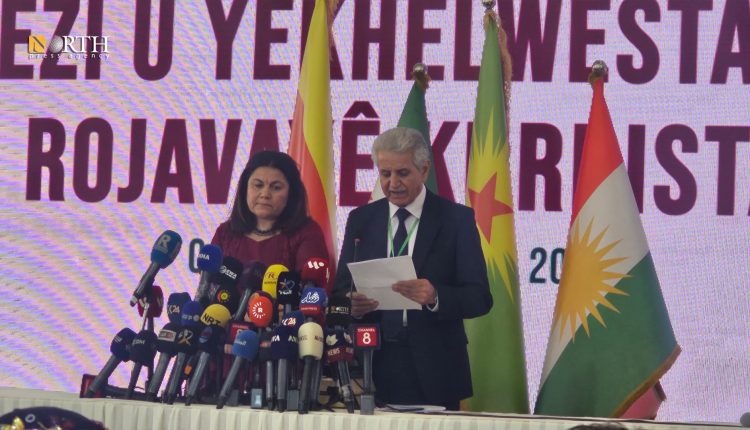What is the content of the political document of Kurdish Unity Conference in Syria?
By Kardo Roj
QAMISHLI, Syria (North Press) –
The Kurdish Unity Conference held on Saturday in Qamishli, northeast Syria, concluded with the announcement of a political document emphasizing constitutional recognition of the Kurdish people and advocating for a decentralized federal system in Syria.
The conference, which gathered over 400 Kurdish political and social figures, represents a major step toward consolidating Kurdish unity during a critical moment for Syria’s future.
Contents of the Political Document
North Press obtained the full text of the political document issued at the conference. The document is divided into two main sections: national Syrian issues and Kurdish national demands.
The document includes provisions in the Syrian national framework and the Kurdish national framework, as follows:
First – In the Syrian National Framework:
- Syria is a country of multiple nationalities, cultures, religions, and sects, and its constitution guarantees the rights of all Syrian components — Arabs, Kurds, Syriacs, Assyrians, Circassians, Turkmens, Alawites, Druze, and Yazidis.
- The state is committed to international covenants and treaties, human rights, and the principle of equal citizenship.
- The system of governance in Syria is parliamentary, adopting political pluralism, the peaceful transfer of power, and the separation of powers, and relying on regional councils within a decentralized system.
- Syria is decentralized, ensuring the fair distribution of authority and wealth between the center and the regions.
- The state prohibits ethnic and religious discrimination against any national or cultural component of Syrian society.
- The state guarantees freedom of religions and beliefs, the practice of religious rites, and recognizes the Yazidi faith as an official religion.
- A unifying national identity that respects the specificities of different entities.
- Ensuring Syrian equality between women and men and their representation in all institutions.
- Ensuring economic policies issued by the state and regulating international contracts, while supporting and assisting them according to the nature and capabilities of their regions, taking into account their specific needs compatible with their nature and age.
- Revisiting the current administrative divisions to account for population density (demographic clusters) and geographic area.
- The restoration of looted Syrian antiquities and artifacts that were transferred inside or outside the country to their original locations.
- The annulment and cessation of the effects of demographic change in Kurdish areas and all Syrian areas, ensuring the safe return of displaced and forcibly displaced persons to their homes, including those from Sere Kaniyeh (Ras al-Ain), Tel Abyad (Gire Spi), and Afrin.
- The formation of a constitutional body under international auspices, including representatives of all Syrian components, to draft democratic principles and establish a government comprising all Syrian spectrums and components with full executive powers.
- The right to express, teach, and learn in the mother tongue, and the practice of culture as a right for all components.
- The declaration of March 8 as Women’s Day.
Second – In the Kurdish National Framework:
- The unification of Kurdish regions as a single, integrated political and administrative unit within a federal Syria.
- Recognition of the national existence of the Kurdish people in Syria as an indigenous people, and constitutional guarantee of their national rights in accordance with international covenants and treaties, including their right to freely and equally exercise their political, cultural, and administrative rights.
- Appreciation of the sacrifices of the martyrs of the Syrian revolution, the Syrian Democratic Forces, the security forces, and detainees who died in prisons, as well as the martyrs who fell resisting ISIS and its atrocities, with support for their families and the guarantee of their rights through legal provisions.
- Considering youth as the active force in society, and ensuring their participation and fair representation in all state institutions.
- Constitutional recognition of the Kurdish language as an official language alongside Arabic, and guaranteeing education and learning in it.
- Establishment of centers and administrations concerned with the Kurdish language, historical heritage, and culture; launching Kurdish-language media outlets including radio and television stations; publishing books, magazines, and printed materials; and opening research and studies centers.
- Guaranteeing Kurdish participation in legislative, judicial, executive, and security state institutions.
- Adoption of March 21 (Newroz) as an official holiday in the country, and March 12 as a day of remembrance for the Qamishli Uprising.
- Ending the exceptional policies, procedures, and laws enacted against the Kurds, such as the Arab Belt project, reversing their political consequences, ensuring the return of the displaced, restoring balance to development policies, and reinstating canceled agreements that affect Syrian sovereignty and Kurdish existence.
- Restoring Syrian citizenship to Kurdish citizens who were stripped of it under the exceptional 1962 census, including “muqayideen” (those registered but noted with restrictions) and “maktoumeen” (unregistered individuals).
- Developing the infrastructure of Kurdish regions and allocating a share of their natural resource revenues for development and reconstruction, in light of the deliberate marginalization and neglect they suffered in previous periods.
Toward a Shared Future
The Kurdish Unity Conference signifies a major political milestone, offering a vision for an inclusive, democratic Syria where the rights of all communities are safeguarded.
While achieving these goals remains contingent upon broader political developments, the conference marks a determined effort by Kurdish leaders to unify their ranks and contribute to a democratic solution to the Syrian crisis.

